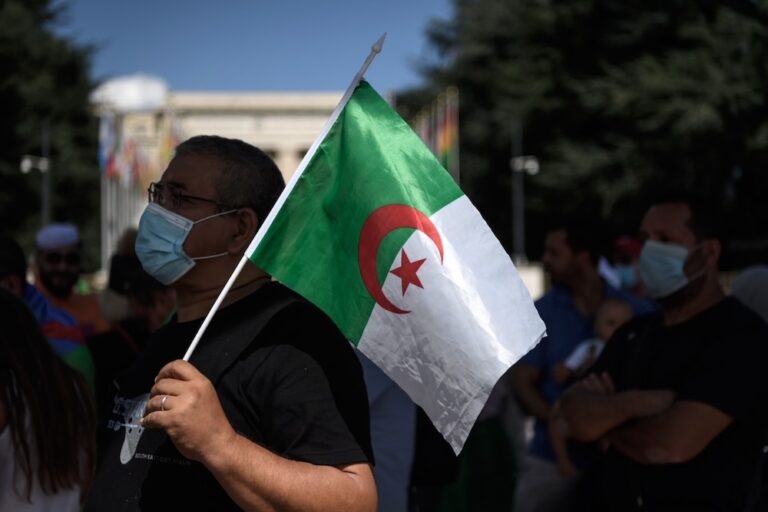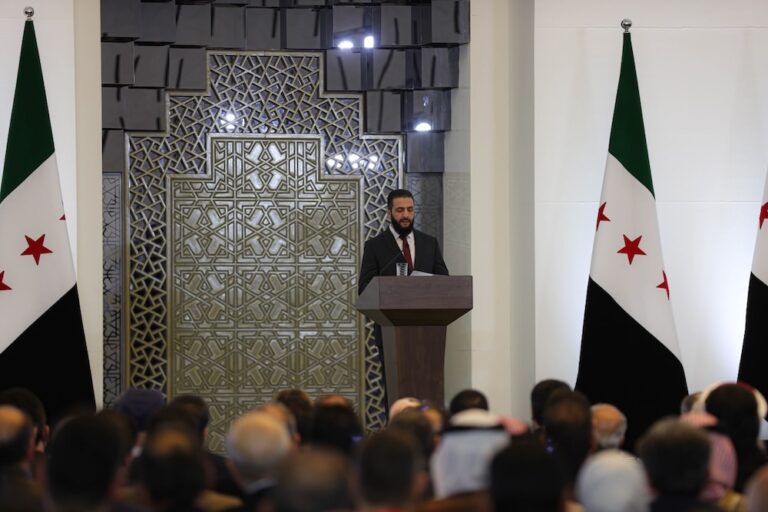(Freedom House/IFEX) – The following is a Freedom House press release: GLOBAL PRESS FREEDOM DECLINES FREEDOM HOUSE CITES “CENSORSHIP BY STEALTH” NEW YORK, APRIL 29 – The degree of press freedom in the world declined in 1998, according to a survey of the news media issued today by Freedom House. It blamed the setback on […]
(Freedom House/IFEX) – The following is a Freedom House press release:
GLOBAL PRESS FREEDOM DECLINES
FREEDOM HOUSE CITES “CENSORSHIP BY STEALTH”
NEW YORK, APRIL 29 – The degree of press freedom in the world declined in
1998, according to a survey of the news media issued today by Freedom House.
It blamed the setback on restrictions imposed by governments through
legalistic means rather than outright oppression or violence. The study
called this “censorship by stealth.”
The survey, “News of the Century: Press Freedom 1999,” is the 21st annual
news media study issued by Freedom House, which monitors political and civil
rights worldwide.
Freedom House ranks press freedom on a scale of 1 to 100, with a lower score
indicating a country with a freer press. In 1998, the average press-freedom
level of 186 countries was 49.04, a decline from 1997 of nearly three
percent. A score between 31 and 60 represents partly-free news media. The
1997 average was 46.29.
The negative trend is “particularly disturbing because it reverses, even if
temporarily, the twentieth century’s movement toward the enlargement of
press freedom,” declared Leonard R. Sussman, coordinator of the survey.
“While physical attacks, even murder and arrest of journalists have not
ended, regimes increasingly use subtle legislation such as ‘insult laws’ to
restrict criticism,” Sussman added.
Sussman noted that some reductions in press freedom were found in 53
countries, while slight improvement was noted in only 20 nations. “Nearly 30
percent of 186 countries took new initiatives to restrict, if not silence,
press reports and especially dissent,” Sussman stated. “That is disturbing
at a time when more democracies exist than ever. The trend suggests a form
of censorship by stealth – the use of innocuous-sounding laws to restrict
reporting and inspire self-censorship.”
These laws generally emphasize the “duties” of journalists to protect
national security, public health and morals, and the reputations of
citizens, especially rulers and their parties.
The survey listed 68 countries (36 percent of the world’s total) as having
a free press, 52 (28 percent) partly free, and 66 (36 percent) with news
media that are not free. Major declines in press freedom were noted in
Ghana, Peru, and Jordan, whose media declined from partly free to not free,
while Namibia and Samoa declined from free to partly free.
Most reductions in news media freedom were marginal. Yet only 1.2 billion
people live in nations with a free press, 2.4 billion where the press is
partly free, and another 2.4 billion in not-free nations.
Improvement was noted in Bosnia-Herzegovina, Indonesia, and Nigeria, which
moved from not free to partly free. Mongolia, Slovakia, and Thailand entered
the free category from the partly free. The most notable improvement was
registered in Nigeria. With the death of the country’s dictator Sani Abacha
in July, many press restrictions were removed. In the months before his
death, two journalists were shot to death, 23 were
arrested, and 24 others physically attacked.
With the fall of the Suharto government last year, Indonesian journalists
enjoyed a marked improvement in press freedom. Yet given the country’s
unsettled political and economic conditions and the persistence of ethnic
tensions, journalists continue to exercise self-censorship in their
political reporting.
Peru’s newspapers and magazines felt increasing pressure from President
Fujimori, whom many believe is planning to run for a constitutionally
prohibited third term. Since 1992, many print and broadcast journalists have
been intimidated by libel suits, detention, house arrest, and in one famous
case, the revocation of a television station owner’s citizenship.
In Asia, the press was rated not free in Malaysia and Singapore. The
financial crisis that provoked riots last year in Malaysia caused the
government to criticize and censor foreign journalists and to exert
additional pressures on the domestic news media. In Singapore, a
government-linked company operates all four “independent” television
channels and 10 of 15 radio stations. The internet must be accessed through
a government censor’s server. All major newspapers and 20 percent of cable
television are owned by a commercial company with strong ties to the
government.
The survey reports a modest decline in press freedom in Russia. Communists
in the Duma (parliament) are calling for greater censorship, but ailing
president Boris Yeltsin vowed to protect the press and fight censorship with
“all our strength.” Nevertheless, the Russian print and broadcast press are
increasingly subject to control by Russia’s oligarchs, who own practically
all major media, as well as by political operatives.
Each country’s score is determined by assessing its press laws and their
administration, the degree of political and economic influence on
journalistic content, and actual cases of violations ranging from harassment
of journalists and the media to physical attacks and murder. Last year, 35
journalists were killed on the job, another 284 were physically attacked,
329 were arrested, and 749 journalists and their institutions were harassed,
banned, or otherwise threatened.
NOTE TO EDITORS: Single copies of the 20″ x 30″ poster “Map of Press
Freedom 1999” in three colors may be obtained, free of charge, from Freedom
House, 1319 18th Street, NW, Washington, DC 20036 (phone 202-296-5101). The
36-page “News of the Century: Press Freedom 1999” and the 600-page “Freedom
in the World: The Annual Survey of Political Rights and Civil Liberties,”
may be obtained from the same location.
Freedom House is a nonprofit, nonpartisan organization that promotes liberty
and democracy throughout the world. It seeks an engaged U.S. foreign policy;
evaluates human rights conditions; sponsors public education campaigns;
facilitates training and other assistance to promote democracy and free
market reforms; and provides support for the rule of law, free media and
effective local governance.


